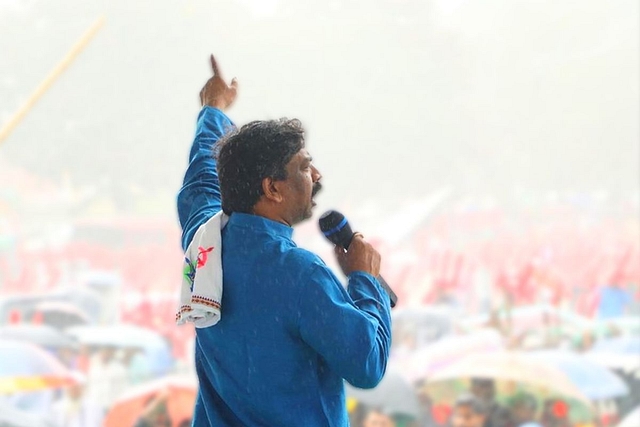
How Hemant Soren, Who Was Father And Former Jharkhand CM Shibu Soren’s Backroom Boy, Became The Face Of JMM
The main reason why Hemant Soren has won decisively is because he showed he was pro-tribal.
And with the prospects of corporate cannibalisation of all that was dear to tribals, under the BJP government, a revolt by the electorate was waiting to happen.
Till even a year ago, no one in Jharkhand would have imagined that Hemant Soren would become the 11th chief minister of the state.
But the convincing win of the alliance that he led from the front in the just-concluded Assembly elections in the state is the result of the hard work that this second son of Jharkhand Mukti Morcha (JMM) co-founder Shibu Soren put in. And also proof of his coming of age in politics.
Hemant, who is a little over 44 years old, is an ‘accidental’ politician. His elder brother Durga Soren was the heir apparent of the JMM patriarch (Shibu Soren). But Durga Soren’s sudden death in May 2009 catapulted Hemant into politics.
Hemant, who was enrolled in a B.Tech course in mechanical engineering at Birla Institute of Technology in Mesra (Ranchi) but failed to complete it, was happy remaining in the shadows of his father and elder brother.
Shibu Soren was also happy with Hemant being the backroom boy, taking care of family matters and minor organisational affairs of the party (the JMM). Durga Soren, however, was anti-Congress and opposed the seat-sharing deal his father had signed with the Congress ahead of the 2009 Lok Sabha polls.
Durga defied his father and filed his nomination papers from the Godda Lok Sabha seat that the JMM had given to the Congress under the seat-sharing deal. Durga was suspended from the JMM in mid-April 2009, and suffered a fatal stroke a little over a month later.
Hemant then took Durga’s place as the JMM patriarch’s heir apparent. The Assembly elections held later that year gave a fractured mandate with no party getting a majority. The BJP-JD(U) alliance roped in the JMM to form the government with Shibu Soren as the chief minister.
That was Shibu Soren’s third stint as chief minister of the state. But like the earlier two stints, he could not complete his full term since the JD(U) broke ranks with the BJP and the government fell in June 2010.
Following a short stint of President’s Rule, the BJP once again managed to cobble together a majority with the help of Independents and minor parties, and formed the government under Arjun Munda (now Union Tribal Affairs Minister) in September 2010. But that government, too, lasted for a little less than 2.5 years.
After another stint of President’s Rule for nearly six months, Hemant Soren formed the government in July 2013 and remained in office till the next Assembly polls, which brought the BJP to power, in December 2014.
It was over the past five years, as the leader of opposition, that Hemant Soren matured as a politician. He led the fight against the BJP from the front and confronted the Raghubar Das government on many issues.
Hemant Soren led the opposition to changes in the pro-tribal tenancy laws that were proposed by the Raghubar Das government. The changes would have allowed owners and tenants of tribal lands to use those lands for non-agricultural purposes and would also empower the government to take over tribal lands for development projects.
Hemant shot to national limelight when he led protests against the death of an 11-year-old girl due to starvation after the family was not given rations under the public distribution system since their Aadhar number was not seeded to their bank account and ration card (read this).
Hemant, the working president of the JMM, also won support from tribals and the rural poor for opposing transfer of tribal lands to mining companies. He fashioned himself as a champion of tribals who, he says, have not benefited from the abundant natural resources of Jharkhand that were being looted by corporate mining companies.
In fact, his poll campaign focused on the sorry plight of tribals and moolvasis (original inhabitants) in the mineral-rich state. His advocacy of total prohibition in the state also won him public approval and support.
Hemant Soren has a large following among women voters since he brought in 50 per cent reservation for women in government jobs when he was the chief minister from July 2013 to December 2014.
Hemant is also remembered for effectively tackling Maoist insurgency in Saranda and West Singhbhum through a ‘carrot and stick’ policy — a mix of security operations and development initiatives.
But it is Hemant’s firm and consistent advocacy of a much greater stake for tribals and moolvasis in the mining sector that has won him strong public support.
Hemant Soren also showed political acumen by stitching an alliance with the Congress, Lalu Prasad’s Rashtriya Janata Dal (RJD) and the Jharkhand Vikas Morcha (Prajatantrik) in March this year.
He led the alliance from the front and started campaigning much before the BJP hit the campaign trail. Hemant led a spirited and effective campaign against the BJP and canvassed tirelessly and intensively across the length and breadth of the state.
Hemant has won the admiration of political pundits for the manner in which he stitched and managed the mahagathbandhan and designed the campaign strategy.
Away from the political arc-lights, he is a quiet family man who likes to spend time with his wife Kalpana and two young sons.